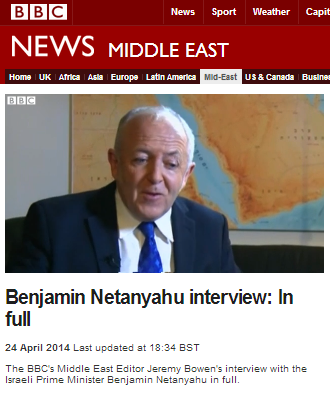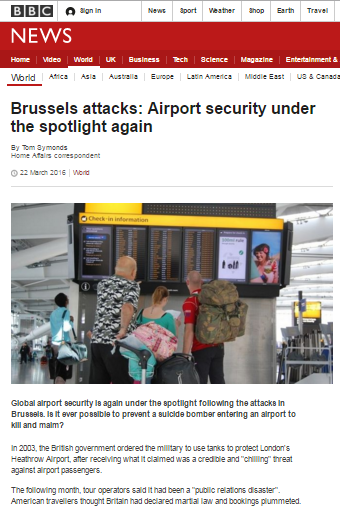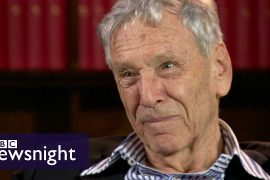Over the past nine months, since the most recent round of negotiations between Israel and the PLO commenced, we have frequently noted on these pages that BBC reporting on the topic has invariably steered clear of the issue of the Palestinian Authority’s incitement and glorification of terrorism (see here) as well as its payments to convicted and released terrorists. In addition, the BBC has also failed throughout those nine months to properly clarify to its audiences the real significance of Israel’s demand that the PA recognise Israel as the Jewish state (see for example here, here and here).
Beyond the significant fact that these editorial policies have clearly sold short the very BBC audience members to whom the corporation pledges to build a global understanding of international issues which will supposedly “[e]nable individuals to participate in the global debate on significant international issues”, those policies have also established an internal structure of ‘no-go areas’ for BBC journalists themselves.
Those ‘no-go areas’ are essential foundations for the framing of BBC presentation of the entire topic of the latest round of negotiations as well as the broader representation of the entire peace process. Nowhere was that more clear than in the recent interview with the Israeli Prime Minister conducted by Middle East Editor Jeremy Bowen which was broadcast on BBC television news and publicized on the BBC News website on April 24th.
If we break the interview down, we see that after the initial three short questions – two open and one closed – Bowen shifts to much longer ones which are actually constructed primarily around his own messaging, with a component of a question added in some cases. His fourth question is a repetition of the previously used theme of isolated focus on scepticism concerning the deal itself, but without any relevant information concerning its real significance.
“But looking at it realistically, they’ve [the Palestinians] tried before to mend this split. They haven’t succeeded; there are still many differences between them; the chances are it may well not work. But isn’t it…wouldn’t it be better for you to be able to speak to a Palestinian side as well which is united, because if they ever made a deal with you, they’d be better placed to deliver it?”
In his fifth question, Bowen invokes the inaccurate, misleading – and very jaded – IRA analogy which steers audiences towards the misconceived impression that the two conflicts are comparable and therefore solvable in the same fashion.
“Now, Britain negotiated with the IRA and finally managed to make a peace agreement and Britain continued to negotiate with the IRA even when they were taking action against the British. Isn’t that the sensible way to make peace?”
As Prime Minister Netanyahu points out in his reply to Bowen’s question and as Lord Trimble has previously noted:
“Republicans in Northern Ireland wanted to wrest it away from the United Kingdom, but never assaulted the legitimacy of Great Britain or aspired to destroy it. Why, then, should lessons from the British-IRA conflict apply to that between Israel and Hamas or Hizballah, when the latter terrorist organizations declare Israel illegitimate and vow to destroy it?”
Additionally, Bowen’s time-wasting and misleading use of that inappropriate analogy fails to clarify to viewers that the international body under the leadership of George Mitchell, which was involved in brokering the Irish agreement, demanded the “absolute and total commitment” of parties involved in the negotiations to six pre-established principles.
“a. To democratic and exclusively peaceful means of resolving political issues;
b. To the total disarmament of all paramilitary organizations;
c. To agree that such disarmament must be verifiable to the satisfaction of an independent commission;
d. To renounce for themselves, and to oppose any effort by others, to use force, or threaten to use force, to influence the course or the outcome of all-party negotiations;
e. To agree to abide by the terms of any agreement reached in all-party negotiations and to resort to democratic and exclusively peaceful methods in trying to alter any aspect of that outcome with which they may disagree;
f. To urge that ‘punishment’ killings and beatings stop and to take effective steps to prevent such actions.”
Of course, no such demands have been made of Hamas – with which the PA has now signed a unity deal – or the other Palestinian rejectionist factions.
Bowen’s sixth question is enabled by the fact that – as noted above – BBC audiences have not been informed of PA incitement, glorification of terrorism and payment to convicted and released terrorists.
“But Mr Abbas is not doing any of those things [preaching and practicing attacks on Israel]. He says he wants to continue with negotiations. But isn’t it a fact that as well that people negotiate peace and peace deals with their enemies, not with their friends? You’re gonna have to get over that.”
In question seven Bowen says:
“The fact is though that Mr Abbas does not want to annihilate Israel. He wants to work with Israel. The PLO recognized Israel as a legitimate entity – as a legitimate state – a long time ago and the issue of recognizing Israel as a specifically Jewish state – with your 20% Arab population here – is something for them which is a different issue.”
Again, the fact that BBC audiences not only remain unaware of the real significance of the PA’s refusal to recognize Israel as the Jewish state, but also have had the topic presented to them exclusively as framed under the Palestinian narrative, is very important here. Bowen could not pose his question in this manner if viewers were aware of what that recognition – and Abbas’ refusal to give it – really means and he could not categorically claim that the Palestinian president “does not want to annihilate Israel” had BBC audiences been informed of the real meaning and aims of the PLO’s demand for Palestinian ‘right of return’ and its support for the Boycott, Divestment and Sanctions campaign, as noted and promoted by Bowen in a previous report.
Bowen’s final two ‘questions’ are simply amplifications of the Palestinian Authority’s position.
“Now I’ve been talking to the Palestinians today about all of this and a lot of them are saying look – the Israelis never had their hearts in this. Mr Netanyahu never wanted to make a deal and now he’s simply grabbing onto this and running with it because it gives him an excuse to get out of it.”
“The Palestinians say that you continue to take their land, to build and extend settlements, that you’re not serious about a peace process and that is why they’re build….they’re moving to some internal unity and applying as well to international organisations and in their view they feel they can change the balance of power and get a stronger position for them in any future negotiations.”
Despite the fact that this is a relatively long interview, we see that much of it was wasted on the introduction of an irrelevant analogy between two very different conflicts and on the promotion of the Palestinian Authority/PLO narrative. We also see the cumulative effects of nine months of reporting with ‘no-go areas’ – such as the subject of recognition of Israel as the Jewish state and PA glorification of terrorism – and how that well-entrenched framing of the issue interferes with the BBC’s ability to facilitate real audience understanding of this latest development.




